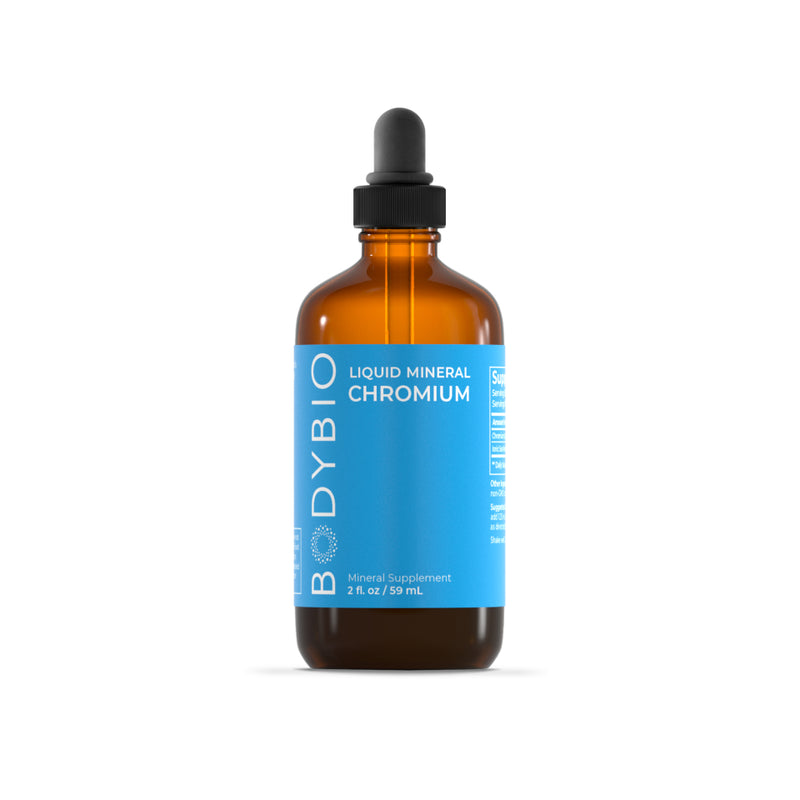Benefits of Chromium: Moving the Needle for Mental Health, Metabolism, & Insulin Resistance
Key Takeaways:
- Chromium is a trace mineral with a recommended daily intake of only about 25-35 micrograms. Because it’s so easy to consume chromium in your diet, it is often overlooked when it comes to creating a healthcare plan.
- Chromium benefits may include blood sugar balancing, weight loss, acne control, and a lowered risk of depression or bipolar symptoms.
- You guessed it — chromium is also great for cellular health since it assists in lipid metabolism. When the body correctly breaks down lipids into fatty acids, those fatty acids can be designated to the body’s tissue and cell membrane, helping to keep free radicals out of the cell.
Trace minerals are often dismissed when it comes to comprehensive healthcare.
This is because trace minerals are (seemingly) easy to consume. For example, one trace mineral, chromium, is found in grains, meats, veggies, nuts, and even spices. We need tiny amounts of this mineral in order to survive — so it makes sense that chromium levels are rarely tested and or considered a factor in chronic illness or other health concerns…
… Or does it?
The truth is, a lot has changed in our diets and mineral consumption over the years. Often, the recommended daily intake of trace minerals like chromium only considers the amount of that mineral that we need to survive, not thrive.
And the science backs it up. Chromium supplements are known to help with blood sugar balancing, weight loss, depression and anxiety, and so much more. When given chromium supplements, many people discover this trace mineral moves the needle for their health — and is exactly what they need to keep persistent symptoms at bay.
Let’s dive deeper into the benefits of chromium…
Table of Contents:
- What Does Chromium Do for the Body?
- Is Chromium Deficiency Real?
- Health Benefits of Chromium
- Benefits of Chromium Supplements
- Chromium and the Cells: Understanding Chromium and Lipid Metabolism
- Is Chromium Deficiency Taking a Toll On Your Health?
What Does Chromium Do for the Body?
Chromium is a trace mineral found in most major food groups. While it has many important jobs, chromium is perhaps best known for its ability to help reduce insulin resistance.
It’s a common supplement for people with type 2 diabetes, insulin resistance, and Polycystic Ovarian Syndrome (PCOS) — all diseases that have to do with unstable blood sugar regulation.
Chromium has also been linked to mental health — as some studies show promising effects on patients with depression, anxiety, and bipolar disorder.
Is Chromium Deficiency Real?
Since chromium is a trace mineral, about 25 to 35 micrograms is recommended daily (depending on your age). However, chromium is relatively understudied, and adequate intake doesn’t necessarily mean enough to feel your best.
Current research on chromium doesn’t even recommend a tolerable upper intake level (UL), since chromium toxicity is virtually unheard of, and excess chromium is eliminated in the urine.
Chromium is readily available in grains, meats, fruits, and veggies. However, deficiencies have been noticed in patients with type 2 diabetes, insulin resistance, and during pregnancy, where supplements may be needed. Those with chronic illness or chronic stress should also consider chromium deficiency, as any kind of stress on the body can quickly deplete mineral stores rapidly.
Health Benefits of Chromium
Sure, trace minerals may not get a lot of fanfare — but they’re so necessary. We could not survive without chromium! Here are just some ways chromium is working behind the scenes to benefit your body and health:
Blood Sugar Balancing
Chromium helps convert glucose into energy — which is essential for blood sugar balancing. Often, when considering insulin resistance, we blame high-sugar diets. But remember, our bodies have been metabolizing natural sugar and carbs as our primary food source for hundreds of thousands of years. There is no doubt that high processed sugar consumption has contributed significantly to the alarming rate of insulin resistance over the last few decades, but this is not the whole story. We also have to look at deficiencies in key nutrients like trace minerals that are contributing to the problem.
Interventions like chromium and other trace mineral supplements can help our bodies “reboot” on a molecular level. And, this is backed by science. One study shows that people diagnosed with type 2 diabetes have lower levels of chromium present in their blood.
Another meta-analysis study of type 2 diabetes patients showed that chromium supplementation lowered A1C by 0.6% (on average) and “significantly improved glycemia among patients with diabetes.”
Chromium for Weight Loss
Chromium has been studied as a treatment for weight loss, and can often be accompanied by other health-focused lifestyle measures (like diet, detox, and exercise).
The blood sugar balancing effects of chromium could help with weight loss if your excess weight is primarily insulin driven. Look for symptoms like carb cravings, shakiness when hungry, frequent urination, fatigue, and brain fog as possible signs of high or low blood sugar.
Chromium for weight loss (usually in supplement form alongside a healthy diet) could be the perfect first-line intervention before more serious measures need to be taken to protect your endocrine system.
Acne Improvement
Blemishes and blood sugar spikes actually have a lot in common. When something is out of whack internally, it can often show up on the face. With insulin resistance, type 2 diabetes, and PCOS, acne is common and may be the result of unstable blood sugar and hormones.
By adding a chromium supplement to your routine, you may be able to stop acne at the root source by balancing your blood sugar.
Mental Health — Depression, Anxiety, and Bipolar Disorder
There are so many things that could influence your mental health. From a lack of phospholipids and essential fatty acids to diet, medication side effects, chronic illness, and inflammation — it’s difficult to know right off the bat which root cause is at the forefront of your depression symptoms.
There are a lot of measures you can take to get your brain back on track: like regular exercise, sun exposure, grounding, medication, brain retraining, and detox. But one simple intervention, chromium, is often overlooked.
And that’s unfortunate because chromium and other mineral supplements offer a quick and easy way to heal from a cellular level. Low levels of chromium (and magnesium!) are often associated with mental health conditions. More importantly, these essential minerals for the body can be depleted when taking medications and should be tested regularly.
Benefits of Chromium Supplementation
The good news about chromium is there hasn’t yet been an established “upper limit” intake. Excess chromium is excreted through urine, so taking a chromium supplement is fairly safe for your health and worth trying.
In scientific studies, chromium supplements have been proven to help with insulin resistance, depression, and weight loss. When choosing a chromium supplement, make sure you find one without additives or fillers. We prefer liquid form, as it absorbs easier into the body.
Chromium and Your Cells: Understanding Chromium and Lipid Metabolism
Lipid metabolism is the breakdown of fats in the body. When you eat fatty foods, those fats must break down in the liver for use in your cells, tissues, and in the brain (which is 60% fat!).
Chromium aids in the breakdown (or metabolism) of lipids, helping the body to store healthy fats for energy in the adipose tissue. Eventually, these fats (or fatty acids, on an individual level) may be designated to help create your cell membranes, which protect the cell itself from free radicals and other toxins.
This is why we’re so passionate about minerals — because mineral health is cellular health. They’re the spark plugs for your cells!
Is Chromium Deficiency Taking a Toll On Your Health?
We believe chromium deficiency is impacting far more people than anyone previously thought. Alongside other minerals, chromium is depleted in situations of chronic stress and illness. Meanwhile, our soil quality is slowly deteriorating and people are spending less time outdoors than ever before.
This is a perfect storm for chromium deficiency — and as a result, blood sugar imbalance, acne, depression, anxiety, and more.
That’s why we created our full line of Liquid Minerals. Designed to absorb quickly into the bloodstream and go directly where your body needs it most (the cells!), liquid chromium is an easy intervention for those who are ready to see a real difference in their health.
Many of our customers have found that this simple mineral supplement is one of the biggest needle movers in their health journey!
Experience the Difference Balanced Minerals Can Do For Your Body — Try Liquid Chromium
Havel P. J. (2004). A scientific review: the role of chromium in insulin resistance. The Diabetes educator, Suppl, 2–14.
Sylvia, L. G., Peters, A. T., Deckersbach, T., & Nierenberg, A. A. (2013). Nutrient-based therapies for bipolar disorder: a systematic review. Psychotherapy and psychosomatics, 82(1), 10–19. https://doi.org/10.1159/000341309
Ngala, R. A., Awe, M. A., & Nsiah, P. (2018). The effects of plasma chromium on lipid profile, glucose metabolism and cardiovascular risk in type 2 diabetes mellitus. A case - control study. PloS one, 13(7), e0197977. https://doi.org/10.1371/journal.pone.0197977
Fazelian, S., Rouhani, M. H., Bank, S. S., & Amani, R. (2017). Chromium supplementation and polycystic ovary syndrome: A systematic review and meta-analysis. Journal of trace elements in medicine and biology : organ of the Society for Minerals and Trace Elements (GMS), 42, 92–96. https://doi.org/10.1016/j.jtemb.2017.04.008
Khodavirdipour, A., Haddadi, F., & Keshavarzi, S. (2020). Chromium Supplementation; Negotiation with Diabetes Mellitus, Hyperlipidemia and Depression. Journal of diabetes and metabolic disorders, 19(1), 585–595. https://doi.org/10.1007/s40200-020-00501-8
Chen, J., Kan, M., Ratnasekera, P., Deol, L. K., Thakkar, V., & Davison, K. M. (2022). Blood Chromium Levels and Their Association with Cardiovascular Diseases, Diabetes, and Depression: National Health and Nutrition Examination Survey (NHANES) 2015-2016. Nutrients, 14(13), 2687. https://doi.org/10.3390/nu14132687
McLeod, M. N., & Golden, R. N. (2000). Chromium treatment of depression. The international journal of neuropsychopharmacology, 3(4), 311–314. https://doi.org/10.1017/S146114570000208X
Tian, H., Guo, X., Wang, X., He, Z., Sun, R., Ge, S., & Zhang, Z. (2013). Chromium picolinate supplementation for overweight or obese adults. The Cochrane database of systematic reviews, 2013(11), CD010063. https://doi.org/10.1002/14651858.CD010063.pub2






